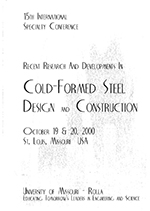Session Dates
19 Oct 2000
Abstract
Cold-formed steel shapes have been widely employed in steel construction, where they frequently offer a lower cost solution than do traditional laminated shapes. A classic application of cold-formed steel shapes is purlins in the roof panel of industrial buildings, connected to the roof panel by means of screws. The combined effect of these two elements has been the subject of investigations in some countries. Design criteria were included in the AISI Code in 1991 and 1996. This paper presents and discusses the results obtained from bending tests carried out on shapes commonly used in Brazil, i.e., the channel and the simple lipped channel. Tests were carried out on double shapes with 4.5 and 6.0 meter spans, which were subjected to concentrated loads and braced against each other on the supports and at intermediary points in three different load situations. The panel shape was also analyzed experimentally, simulating the action of wind by means of a "vacuum box" designed specifically for this purpose. The test results were then compared to those obtained through the theoretical analysis, enabling us to extract important information upon which to base proposed design criteria for the new Brazilian code.
Department(s)
Civil, Architectural and Environmental Engineering
Research Center/Lab(s)
Wei-Wen Yu Center for Cold-Formed Steel Structures
Meeting Name
15th International Specialty Conference on Cold-Formed Steel Structures
Publisher
University of Missouri--Rolla
Document Version
Final Version
Rights
© 2000 University of Missouri--Rolla, All rights reserved.
Document Type
Article - Conference proceedings
File Type
text
Language
English
Recommended Citation
Goncalves, Roberto Martins; Malite, Maximiliano; and Javaroni, Carlos Eduardo, "A Theoretical and Experimental Analysis of Cold-formed Steel Shapes Subjected to Bending - Channel and Simple Lipped Channel" (2000). CCFSS Proceedings of International Specialty Conference on Cold-Formed Steel Structures (1971 - 2018). 1.
https://scholarsmine.mst.edu/isccss/15iccfss/15iccfss-session3/1
A Theoretical and Experimental Analysis of Cold-formed Steel Shapes Subjected to Bending - Channel and Simple Lipped Channel
Cold-formed steel shapes have been widely employed in steel construction, where they frequently offer a lower cost solution than do traditional laminated shapes. A classic application of cold-formed steel shapes is purlins in the roof panel of industrial buildings, connected to the roof panel by means of screws. The combined effect of these two elements has been the subject of investigations in some countries. Design criteria were included in the AISI Code in 1991 and 1996. This paper presents and discusses the results obtained from bending tests carried out on shapes commonly used in Brazil, i.e., the channel and the simple lipped channel. Tests were carried out on double shapes with 4.5 and 6.0 meter spans, which were subjected to concentrated loads and braced against each other on the supports and at intermediary points in three different load situations. The panel shape was also analyzed experimentally, simulating the action of wind by means of a "vacuum box" designed specifically for this purpose. The test results were then compared to those obtained through the theoretical analysis, enabling us to extract important information upon which to base proposed design criteria for the new Brazilian code.



